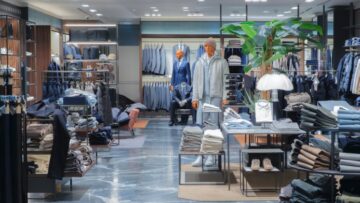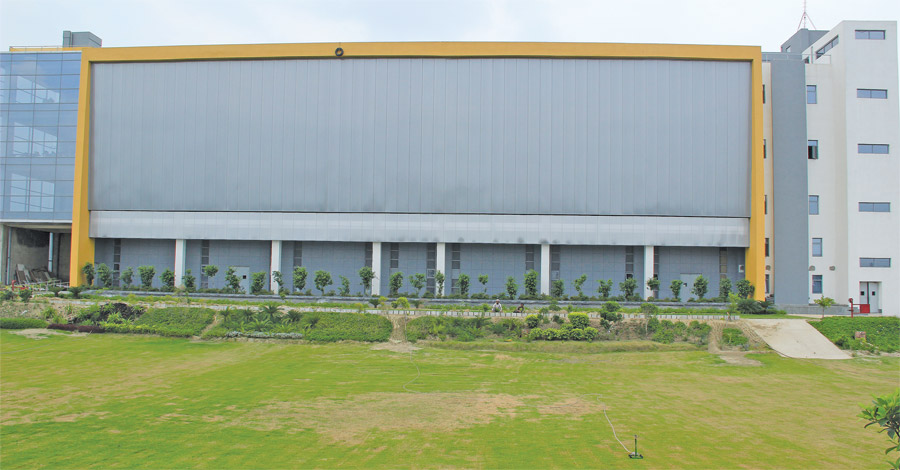
The view from the 3rd floor of Mahajan Overseas’ new factory gives a magnificent bird’s-eye view of the entire Barhi Industrial Area (Sonipat) and one fact that stands out is the beauty and greenery of this unit. Mahajan Overseas has the distinction of being the first ever Green factory in Haryana, and is the first in India which is truly dedicated to home textile products only. Not yet counted among the corporate giants of the home industry, Mahajan Overseas has always shown a very progressive attitude towards the business and is today one of the best and most respected players of the segment from Panipat belt. Apparel Online recently visited the new unit and was impressed with the vision that this upfront company, under the stewardship of Pranab Mahajan, Director has for a sustainable future.
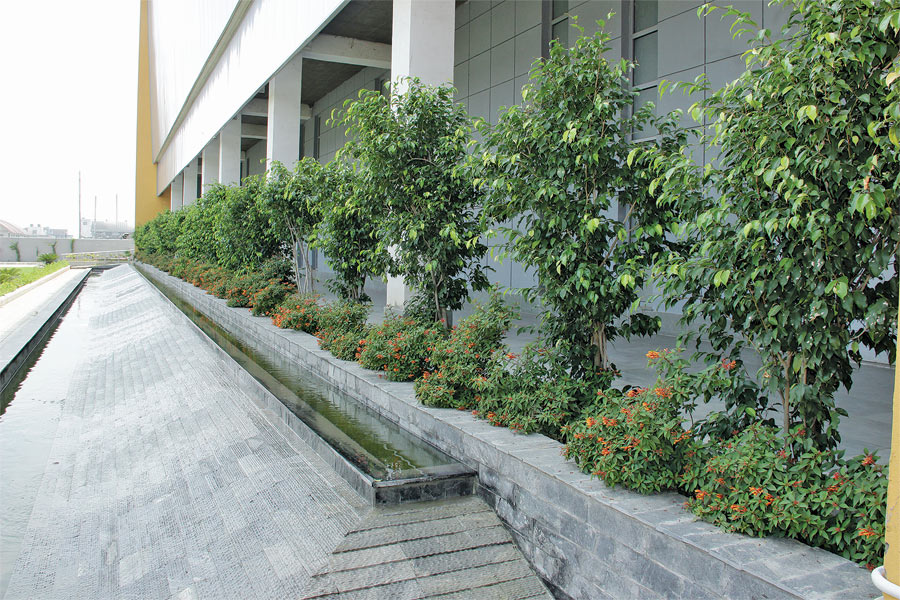
Spread out over a huge area of 4 acres, the Green factory of Mahajan Overseas is in the process of getting a ‘Silver Certificate’ for which audits are under way. The factory is definitely a positive sign for the home textile industry and a benchmark for others to follow, accepting and encouraging the sustainable route for growth, a trend which is hitherto dominated by apparel manufacturing units. A natural beauty, resources that make the factory Green are all from the nature in and around the premises. As one enters the unit, an acre long garden which is almost 6 feet down from the ground level welcomes you. This garden which is now a good source of rain water harvesting, was earlier a source for soil as during the construction the entire requirement of soil was dug from the area rather than buying from outside. Just after the garden, there is a water body, and the area is of high wind flow. Here the water gets filtered by passing through the plants and trees.
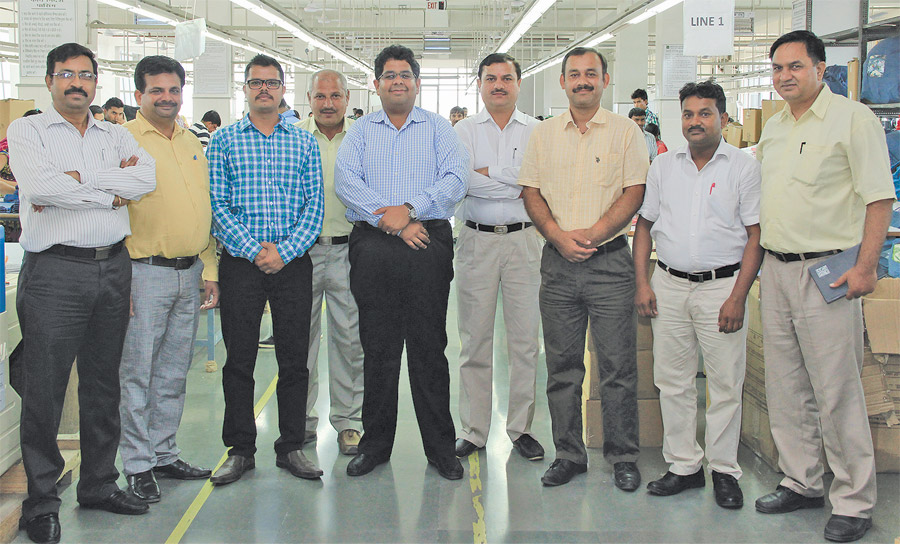
There are suction devices on one side of the water body, which keeps the building naturally cool and ensures that the unit does not require air-conditions even in the peak of summer. Cool air is sucked in from one side and hot air exited from the other side of the building. The factory has four floors (ground to third) and there are 18 suction devices installed on each floor which pull cool air into the factory. The front side of the unit is protected by an imported 16 MM micro honey beam polycarbonate sheet which only allows the light to pass through, blocking the heat. The factory is built in such a way that most of its area doesn’t require turning on tube lights during the day as the sunlight is more than sufficient. Behind the unit, constructed in 1.5 acre, there is ample arrangement for rain water harvesting with a huge underground tank. Not even a single drop of used water in the factory is pumped out as it has a treatment plant and uses the water for irrigation. White tiles have been used on the roof to reflect the sunlight.
An architectural delight, the spacious factory has broad passages, clear signage and separate parking space for physically challenged staff. Maximum usage of wastage was ensured during the construction but it does not reflect in the final building as the waste has been used in very creative ways, be it the electricity poles, roof of the parking space, railings or even the debris of stone, tiles, etc. But all this was not so easy as it sounds, and Pranab was always looking into the huge check list of conditions and instructions given by the Mumbai-based consultant for constructing a Green factory.“From sourcing of building material from nearby places to explaining the concept to the labourers during the construction, was really difficult. As an example, every vehicle coming into the unit with construction material required washing of its tyres when it moved out, so that it could not take away any mud from the premises,” recalls Pranab.
The commitment to go for a sustainable factory requires a vision, as a Green factory cost almost 1.5 times more as compared to a normal one, but it saves 15 to 20 per cent on electricity bills, an equation not everyone understands or appreciates. Interestingly, there was no push from any buyer for this initiative, yet the company has made the investment. “Almost 4 years ago when we thought about expansion and putting up a new factory, we felt why not something different to stay ahead of others, a difference that would give us satisfaction as well as advantage over the others. And when we looked around and saw the fast developments happening on the global front regarding environment, we decided for a Green factory, and now many of our buyers who have visited here have actually increased the quantum of work,” shares Pranab, adding that in coming years even Indian customers will be more aware about such things and their brand ‘maspar’ already doing good business will grow more due to the Green advantage.
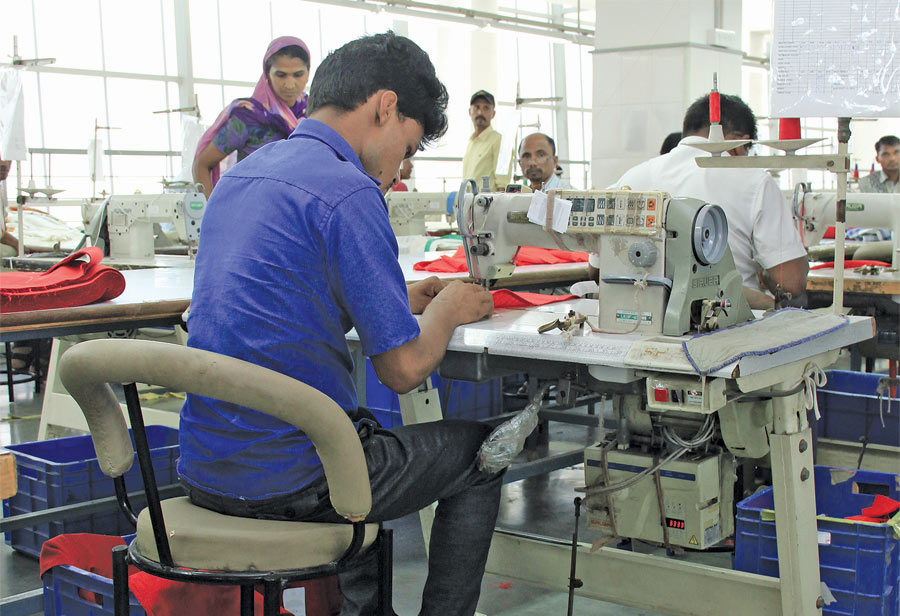
Labour welfare measures taken up
Apart from one-time steps, measures and investments in building a Green factory, ease for workers and their sustainable development is also an important factor in the Green concept, and Mahajan Overseas is not behind in this area. The company has provided transport facility to its workers as most of them are from surrounding villages and use the company’s bus for commuting. Medical checkups and blood donation camps are a regular activity at the company. With the help of Rotary Club, the company organizes camps on various issues like avoiding tobacco abuse for the awareness of the workers. But the thing that impresses the most is the involvement of top management in all activities and the accessibility to workers of the top level as Pranab has fixed 30 minutes once a week for the workers and during that time any worker can come to him and discuss any issue.
Once a month, Pranab’s mother, also visits the factory and talks to women workers so that they can share the things they are not comfortable to share with male staff. “Such efforts give a personalized touch to workers and make them feel like family. Similarly, entire factory contributes willingly whenever any worker’s daughter is getting married. Top management always attends events held by workers and their families as a mark of respect to the workers,” shares Pranab. Each floor of the factory has water coolers and washrooms for workers, which are clean and well-maintained. As carbon filters are installed in these washrooms, they don’t smell. There is a small gym also. The company also motivates its workers by incentives and rewards like ‘operator of the month’, ‘operator of the week’, etc. “We have to upgrade our workers and we feel proud when we see their smiling faces all the time,” adds Pranab.
Expansion plans to go Green continue
Phase one of the company’s expansions is over and now there are ambitious plans to make two more building in this topography but when, depends on business conditions and will take time. In the meanwhile Green initiatives are to continue and the team at Mahajan Overseas is now working on a study of thermal conservation (a costly study) of the heat within the working condition of the premises, where an air-conditioned building in a similar topography is chosen as a benchmark and a simulation is carried out. Results of the study are expected to come very soon. Similarly the company is serious to add solar system in the same premises and for that discussions are already in progress. In coming days, its top floor will have a nice cafeteria and a buyer’s lounge also.
Having its head office in Panipat, Mahajan Overseas is ISO 9002 certified and Sedex approved, and is now working to get SA 8000 or SA 14000. The company offers complete range of home furnishing, be it bedding, kitchen linen. With an annual business of US $ 60 million, the company is mainly catering to European buyers and this year it is expecting at least 10 per cent growth despite all challenges of working in Europe. Its customer profile includes top buyers like M&S and it is also looking for new clients in the US and Middle East. As the factory has small production runs, since it does fashion, its cutting department is mostly manually operated. “We even accept orders of 200 pieces depending on product and style, despite that we are able to control the waste by not producing extra,” says Pranab. Many home furnishing companies in Pranab’s circle appreciate the company for this initiative, but as of now no one has come forward to follow suit. He is confident that the future lies in this direction and once the market conditions are more conducive, some more companies may take the plunge.




